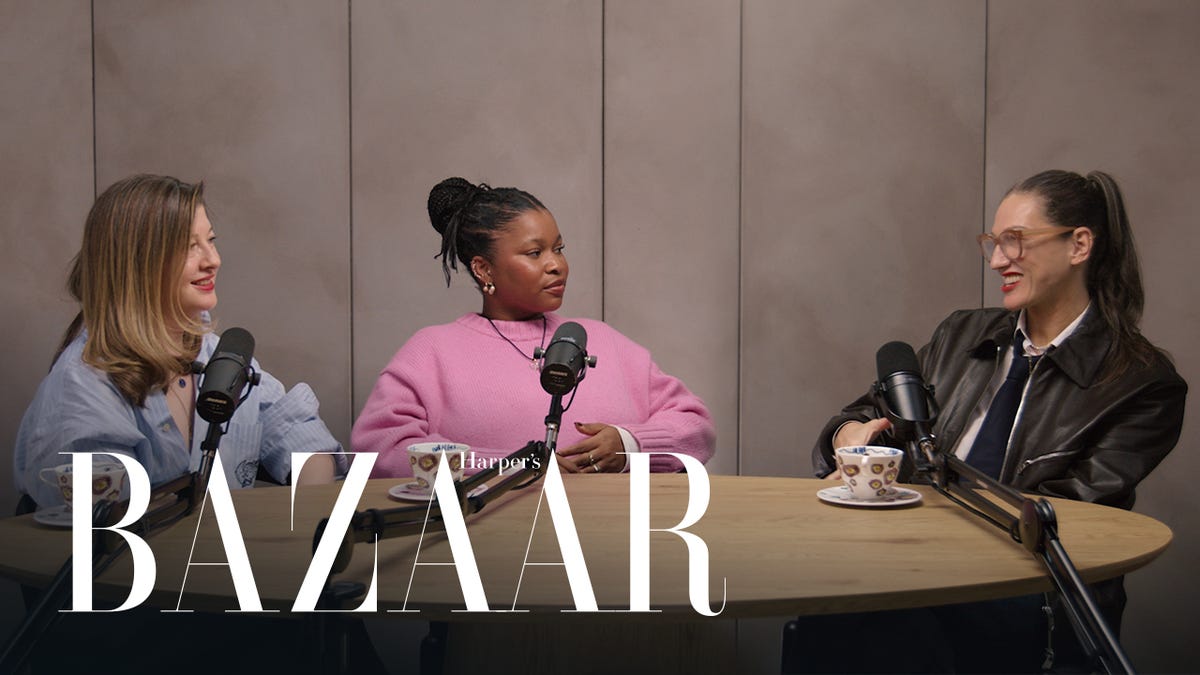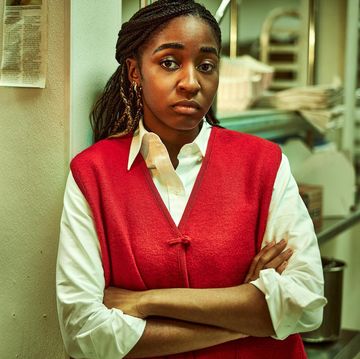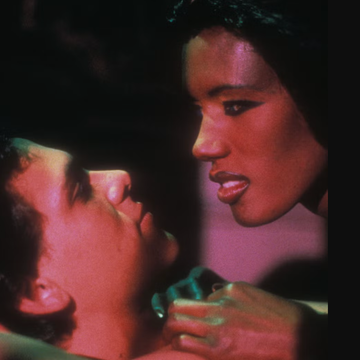When most people think of Charlotte Gainsbourg, comedy probably isn’t what initially comes to mind.
For cinephiles, it might be her haunting performances in Lars von Trier’s infamous Depression Trilogy, made up of 2009’s Antichrist (Gainsbourg won Best Actress at the Cannes Film Festival for her role), 2011’s Melancholia, and 2013’s Nymphomanic—films as viscerally unsettling as they are psychologically profound.
To audiophiles, Gainsbourg is the auteur of five critically acclaimed albums—most recently Rest (2017), a deeply personal exploration of grief and memory. Her music is magnetic, hushed, and unflinchingly intimate—a natural extension of her artistic lineage. She is, after all, the daughter of two titans: English actress and singer Jane Birkin and French provocateur Serge Gainsbourg.
But with Étoile, a new series from television veterans Amy Sherman and Daniel Palladino (Gilmore Girls, Bunheads, The Marvelous Mrs. Maisel), Gainsbourg steps out of the shadows and into the light.
Premiering today on Prime Video, Étoile follows Geneviève Lavigne (Gainsbourg), the interim director of Paris’s storied Le Ballet National, and Jack McMillan (Luke Kirby), the executive director of New York’s Metropolitan Ballet Theatre, as they hatch a plan to save their respective struggling companies among dwindling ticket sales and a general air of malaise surrounding ballet. Geneviève proposes that each company swap some of their top talent for a year to boost interest. While Jack initially snubs the idea, he comes around once he realizes just how dire the situation really is. There’s tension, yes—but also palpable chemistry between the two directors, whose romantic past lingers in the air.
What sets Étoile apart from previous ballet portrayals, aside from its lighthearted humor, is its nuance. The series resists the tired clichés: no melodramatic spiral into drug addiction, no haunting scenes of calorie-counting dancers at war with their bodies. Instead, it offers a reverent glimpse into the ballet world, one that honors the sacrifices, the grace, and the sheer physical artistry required of its performers. Real-life principal dancers, including Unity Phelan and Tiler Peck of New York City Ballet and John Lam of Boston Ballet, bring another layer of authenticity to the show; viewers with a dance background will delight in just how technically exquisite the dancing is.
Ahead of the premiere, Bazaar spoke with Gainsbourg about her desire to take on more comedic roles, why she wishes she’d studied ballet as a child, and the album she’s been working on for the past five years.
This project feels very tonally different from the types of projects you typically do, especially those made for an English-language audience. Was that part of what attracted you to it?
I did a French comedy more than 10 or 15 years ago that was a big success, and I was lucky enough to have recently [made] more comedies in France. I’ve been begging for more, so when this series was offered to me, I was so thrilled to be able to be light in English. I had seen [Amy and Dan Palladino’s] work, so I was very attracted to the show. I only read four episodes out of the eight [before signing on] because the four last ones were not written yet, due to the writer’s strike. It’s difficult to get fully engaged in something you only know half of, but I trusted them and wanted to be a part of the adventure. And I really don’t regret it. It was the first time I was able to [inhabit] a character I love for nine months, to be able to explore all these situations with her.
What drew you to Geneviève’s character in the first four episodes that you read?
The Frenchness of her. And how she had this opposition with Luke’s character, with Jack; I loved that dynamic between the two of us. And getting to explore this world of dance that I didn’t know much about, getting to understand it. I mean, the whole production was huge, and it felt like a completely new experience. Also, one thing that I was scared of was, in my mind, television was something you had to do fast; you had just a few takes to get as much footage as you could without really focusing on the acting. With Amy and Dan, they told me from the start that their way of working was very much actors first. I never felt frustrated about not having worked enough on a scene; they were very demanding, but that’s what I like.
Prior to joining this show, what was your relationship with ballet like? Did you ever take classes, or were you a regular patron?
I [took ballet] when I was four years old, but I don’t remember anything apart from the Polaroid photo of me in a blue outfit with a little diamond tiara and my sister Kate, who was eight, in the same outfit, but pink. My sister decided she wasn’t going to continue ballet, and I didn’t really have a word [in the matter]. I was a tomboy, so the whole feminine-grace [aspect] didn’t resonate. But later on, I wish I had worked on trusting my body. I was so shy as an actress; between the ages of 15 and 25, I struggled with my body, with not being connected to it. If I had had that intelligence of being attracted to dance, I think it would have helped. So, I didn’t really have the experience of doing ballet, but my mother took me to see a lot of [performances by the German neo-expressionist dancer and choreographer] Pina Bausch [when I was younger], and that was a revelation of what dance could be. The actual ballet, with all its tradition, I didn’t really know until we started working on this show.
Of course, for Étoile, I went to see the actual directors of the Ballet of Paris and the Paris Opera, and it was very, very interesting to see their actual offices, which are not as beautiful as the ones in the show. There’s no luxury, but you feel their love for ballet, their love for their dancers, for the whole tradition. In the show, it was interesting to feel that [ballet] was dusty and needed some new excitement to bring audiences back.
In terms of Geneviève’s background, she didn’t come from a wealthy, cultured family. I think that a lot of people might view ballet as this elitist and inaccessible thing, so I thought that was a really nice mechanism to show that ballet is and can be for everyone. Same with Cheyenne; she is a tomboy who works on a fishing boat when she’s not dancing. Did you think about how those characters were breaking down stereotypes?
Yes, and it’s interesting that Luke’s character, Jack, comes from a wealthy family and has that cultural knowledge, while Geneviève worked her way up. You see that her family is modest. Her sister has nothing to do with the ballet and thinks it’s so snobbish. So there’s a real opposition between Jack and Geneviève, and at the same time they understand each other so well; they have this complicity that can work either against them or for them. I had a fantasy that Geneviève was an ex-dancer, but [Amy and Dan] didn’t need that. They had enough dancers. But it resonated with me that dancers have to quit when they’re, what, 35? But for Geneviève, they really wanted someone who was dedicated to ballet, in awe of the artists, but hadn’t been an artist herself. What I love about Geneviève is that she has this vision [for how to reinvigorate her company], and it’s a little too soon for the French audience, especially the French Minister of Culture, but she’s ultimately right.
What’s special about this show is that you can tell that every single person portrayed on camera as a dancer is an actual dancer. What surprised you the most about ballet in working alongside so many of its leading professionals?
It’s so demanding; it’s a world they really have to commit to. I loved seeing the dancers together, feeling for each other. They understand each other’s bodies; there’s something so natural about working your body as an instrument. I’ve never watched that kind of work every day [and seen] what it demands. We’ve seen films on ballet, of course, but when you can see the actual bodies that they have and the torture [they endure]—but they do it with a smile because they’re all in love with it. This show is a celebration of ballet, and it’s very authentic because Amy was a dancer and has that love for ballet.
Being a singer, could you relate to the dancers in terms of understanding the pressure they’re under when they perform?
Not really; for me, it’s completely different. My father taught me that when you don’t have a good voice as a performer—and I don’t have a voice; I’m not a singer in the professional sense—that the less you were in control, the better it was. You had to have accidents. You had to feel insecure for it to be interesting, and with acting it’s somehow similar because I find that when little accidents occur, that’s when it becomes new and interesting. Whereas for dancers, you can’t go onstage without having worked your ass off. Everything has to do with the effort, the repetition, the years of dedication. So with singing, I pray for the haphazard; that’s when I get a bit of magic. If I just work on my voice and try to sing the best I can, it’s boring. Ballet is so precise and technical.
I’ve read that Amy called you “annoyingly cool” because you would just walk up to set wearing a T-shirt and trench coat with tousled hair and look really great. And I feel like Geneviève embodies that too. How does Geneviève approach style and getting dressed each morning?
Thanks to the costume designer, the way that Geneviève dresses helps make the character. She’s very much into fashion, but in a discreet way. She doesn’t wear the office suits that she could wear; she’s very much into her aesthetics. And those high heels she wears—Geneviève portrays herself as this ballet boss, but when she takes them off [it conveys that she is] broken and fragile and not sure of herself. She thinks she’ll get fired at any moment. I loved that opposition. Amy always talks about the ease of French style, but I’m not a cool person. No, I don’t make that much of an effort, but it doesn’t mean that I’m cool.
Do you have a favorite moment or memory from being on set for this season?
The swearing [I got to do] in that telephone scene with Jack was really fun, because I love being able to be aggressive. People often think I’m soft and tranquil and reserved. I love outbursts. There’s another scene where Geneviève runs and slides on that [wooden dance] floor first thing in the morning. That was a lot of fun to do, apart from the splinters.
There are rumblings that you’ve been working on an album. Is that true?
I am, but it’s so boring, because I’ve been working on it since Covid. Every time I think I’m nearly done with an album, I’m not. Once I’m done with a film I’m doing in France, maybe I can really focus on music. I really want to try and perform live again. After Covid, I wanted to do more films, so music always came second. I’m hoping to put it in first position for a while. I always think, “Oh, I’ll be filming and writing music at the same time; it’ll be inspiring.” But it doesn’t happen like that for me. I have to be completely into one project.
This interview has been condensed and edited for clarity.



















